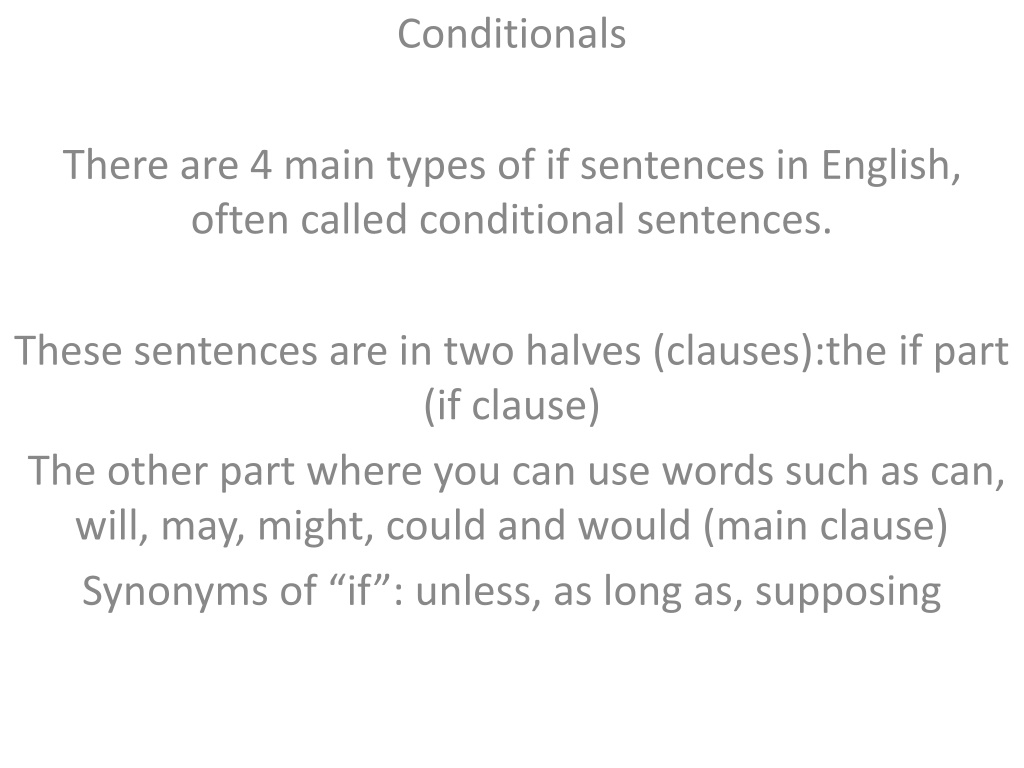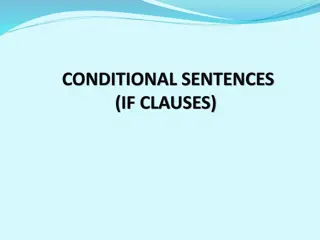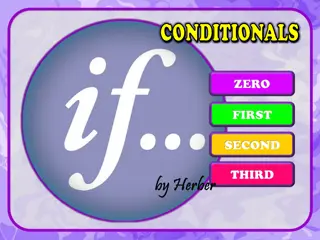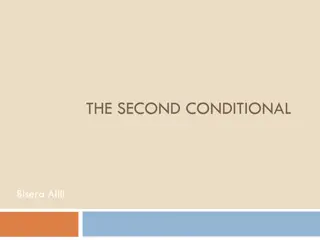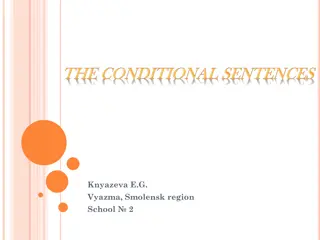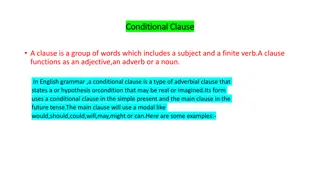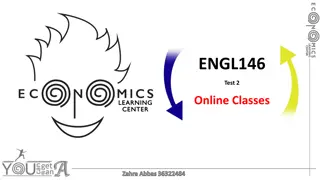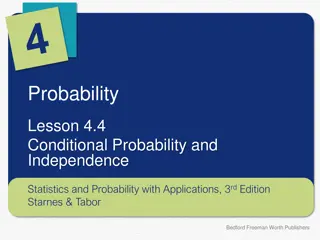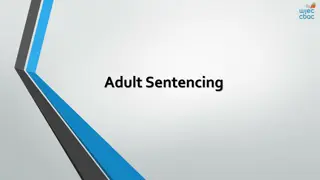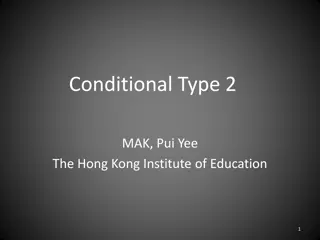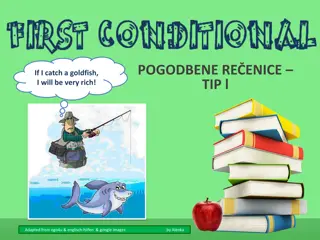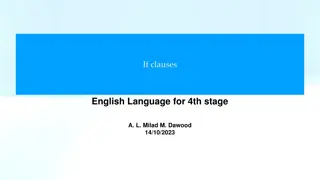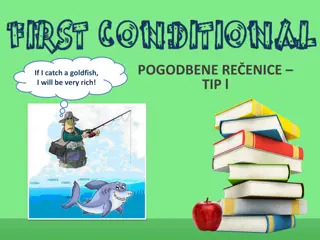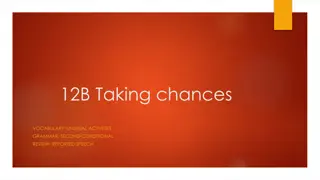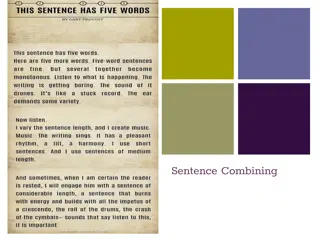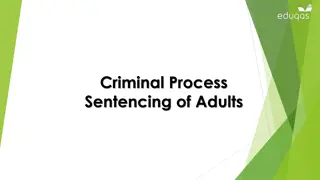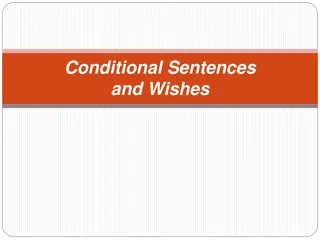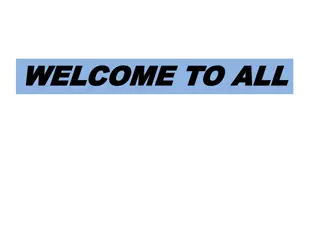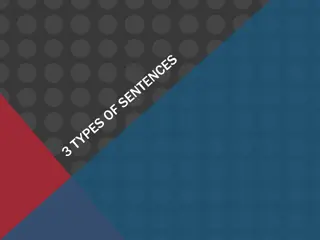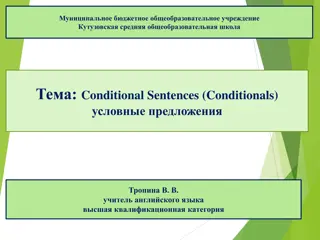Understanding the 4 Main Types of Conditional Sentences in English
Conditional sentences in English consist of two parts: the "if" clause and the main clause. There are four main types of conditional sentences - Zero Conditional, First Conditional, Second Conditional, and Third Conditional. Each type is used to express different conditions and outcomes based on certain situations, possibilities, or facts. Understanding these types helps in conveying thoughts about potential future scenarios or factual events.
Download Presentation

Please find below an Image/Link to download the presentation.
The content on the website is provided AS IS for your information and personal use only. It may not be sold, licensed, or shared on other websites without obtaining consent from the author. Download presentation by click this link. If you encounter any issues during the download, it is possible that the publisher has removed the file from their server.
E N D
Presentation Transcript
Conditionals There are 4 main types of if sentences in English, often called conditional sentences. These sentences are in two halves (clauses):the if part (if clause) The other part where you can use words such as can, will, may, might, could and would (main clause) Synonyms of if : unless, as long as, supposing
The Zero Conditional: If + present simple, ... present simple If you heat water to 100 degrees, it boils.
When do we use this conditional? This conditional is used when the result will always happen. So, if water reaches 100 degrees, it always boils. It's a fact. We are talking in general, not about one particular situation. The result of the 'if clause' is always the main clause. The 'if' in this conditional can usually be replaced by 'when' without changing the meaning. For example: If water reaches 100 degrees, it boils. (It is always true, there can't be a different result sometimes). If I eat peanuts, I am sick. (This is true only for me, maybe, not for everyone, but it's still true that I'm sick every time I eat peanuts) Here are some more examples: If people eat too much, they get fat. If you touch fire, you get burned. People die if they don't eat. You get water if you mix hydrogen and oxygen. Snakes bite if they are scared If babies are hungry, they cry
The First Conditional: If + present simple, ... will + infinitive If + present simple, future simple (future simple: will + Present Simple) If it rains tomorrow, we will go to the cinema.
When do we use this conditional? It's used to talk about things which might happen in the future. Of course, we can't know what will happen in the future, but this describes possible things, which could easily come true. Here are some more examples: If it rains, I won't go to the park. If I study today, I'll go to the party tonight. If I have enough money, I'll buy some new shoes. She'll be late if the train is delayed. She'll miss the bus if she doesn't leave soon. If I see her, I'll tell her.
The Second Conditional: If + past simple, ... would + infinitive If I had a lot of money, I would travel around the world.
When do we use this conditional? First, we can use it to talk about things in the future that are probably not going to be true. Maybe I'm imagining some dream for example. If I won the lottery, I would buy a big house.(I probably won't win the lottery) If I met the Queen of England, I would say hello. She would travel all over the world if she were rich. She would pass the exam if she ever studied.(She never studies, so this won't happen) Second, we can use it to talk about something in the present which is impossible, because it's not true. Have a look at these examples: If I had his number, I would call him. (I don't have his number now, so it's impossible for me to call him). If I were you, I wouldn't go out with that man.
The Third Conditional If + past perfect, ... would + have + past participle (past perfect= had+ past participle) If I had gone to bed early, I would have caught the train.
When do we use this conditional? It talks about the past. It's used to describe a situation that didn't happen, and to imagine the result of this situation. If she had studied, she would have passed the exam (but, really we know she didn't study and so she didn't pass) If I hadn't eaten so much, I wouldn't have felt sick (but I did eat a lot, and so I did feel sick). If we had taken a taxi, we wouldn't have missed the plane She wouldn't have been tired if she had gone to bed earlier She would have become a teacher if she had gone to university He would have been on time for the interview if he had left the house at nine
To sum up: Reality Zero conditional: general truth First conditional: things that might happen Second conditional: dream/ imaginary situation Third conditional: thing that didn t happen and have an imaginary result Imagination
First vs. Zero Conditional: The first conditional describes a particular situation, whereas the zero conditional describes what happens in general. For example (zero conditional): if you sit in the sun, you get burned (here we re talking about every time a person sits in the sun - the burning is a natural consequence of the sitting) But (first conditional): if you sit in the sun, you'll get burned (here we re talking about what will happen today, another day might be different)
First vs. Second Conditional: The first conditional describes things that I think are likely to happen in the future, whereas the second conditional talks about things that I don't think will really happen. It's subjective; it depends on my point of view. For example (first conditional): If she studies harder, she'll pass the exam (I think it's possible she will study harder and so she'll pass) But (second conditional): If she studied harder, she would pass the exam (I think that she won't study harder, or it's very unlikely, and so she won't pass)
Make conditional sentences 1) (Third conditional) If the students (not/be) late for the exam, they (pass) 2) (Third conditional) If the weather (not/be) so cold, we (go) to the beach. 3) (Second conditional) If she (have) her laptop with her, she (email) me. 4) (First conditional) If she (not/go) to the meeting, I (not/go) either. 5) (Third conditional) If the baby (sleep) better last night, I (not/be) so tired.
Useful links http://www.mssch.cz/sites/default/files/_uzivatele/juskova/c onditionals.pdf https://www.liveworksheets.com/worksheets/en/English_as_ a_Second_Language_(ESL)/Conditional_sentences/ZERO,_FIR ST,_AND_SECOND_CONDITIONALS_kd1447hm https://www.ego4u.com/en/cram- up/tests/conditional-sentences-3
